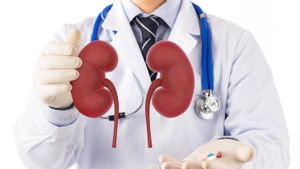JAKARTA - Eating excess sugar does not only have an impact on obesity, but is also bad for heart health.
Reporting from Medical Daily, recent research shows enjoying sweet foods occasionally is likely not at great risk to heart health. However, excessive sugar consumption can regularly increase the risk of stroke and aneurism significantly.
The study revealed that it is not only the quantity of sugar consumed, but also the source, which determines its impact on the risk of heart disease.
In this study, experts found that consumption of sweet drinks such as soda significantly increased the chances of stroke, heart failure, and atrium fibrillation. This finding confirms the importance of understanding sugar sources, not just the amount.
"The main finding of our research is the apparent difference between different types of additional sugar sources against the risk of cardiovascular disease. This highlights that not only is the amount of sugar important, but also its context and origin," explained shot Janzi, author of the study.
To evaluate the impact of various types of sugar on heart health, the researchers analyzed data from two major cohort studies, namely Swedish Mammography Cohort and Cohort of Swedish Men. By using a dietary questionnaire from 1997 and 2009, researchers monitored the sugar consumption habits of 69,705 participants. They tracked the risk of cardiovascular disease until 2019.
The study focuses on three main categories of sugar sources:
The researchers then analyzed its relation to seven types of cardiovascular disease, including two types of stroke, heart attack, heart failure, aorta aneurism, atrium fibrillation, and aorta stenosis.
During the research period, it was recorded that 25,739 participants experienced cardiovascular disorders. The analysis shows that soft drinks have the greatest adverse effects, especially in increasing the risk of ischemic stroke, heart failure, atrium fibrillation, and aorta aneurism.
SEE ALSO:
Research shows that sugar in liquid form, such as in sweet drinks, provides a lower feeling of saturation than sugar in solid form. As a result, people tend to consume excessive sugary drinks, regardless of the adverse effects on health.
"The context of consumption also affects. Snacks are often consumed at certain moments, such as social events, while sweet drinks tend to be drunk regularly," said Janzi.
Research also found interesting results related to snacks. People who rarely or at all don't eat snacks tend to have a greater health risk. This can be caused by overly strict diets due to certain health conditions. On the other hand, moderate consumption of snacks is associated with better health outcomes compared to total restrictions.
"Although this study is observational and cannot prove causal relations, our findings suggest that reducing sugar to a very low level may not be necessary or even beneficial for heart health," Janzi concluded.
The English, Chinese, Japanese, Arabic, and French versions are automatically generated by the AI. So there may still be inaccuracies in translating, please always see Indonesian as our main language. (system supported by DigitalSiber.id)













